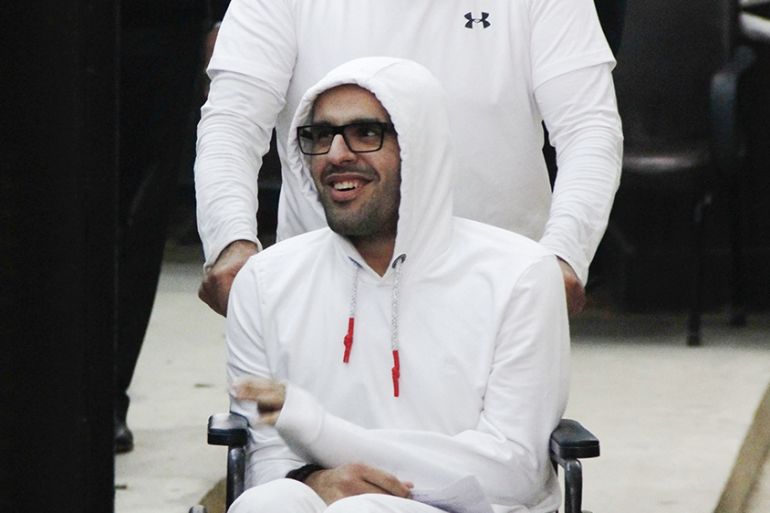US citizen sues ex-Egypt prime minister over arrest and torture
Mohamed Soltan accuses former PM Hazem al-Beblawi of ordering his arrest and torture in 2013.

An American citizen and former Egyptian political prisoner, who was arrested during a brutal crackdown in Cairo in 2013, has filed a lawsuit against former Egyptian Prime Minister Hazem el-Beblawi.
American-Egyptian Mohamed Soltan, 32, a human rights advocate, filed the lawsuit in a court in the District of Columbia on Monday, accusing el-Beblawi of ordering his arrest, torture and attempted assassination.
Keep reading
list of 3 itemsEgypt urged to end ‘relentless’ attacks on journalists
Rights group calls on Egypt to release two disappeared women
Soltan, now a student at Georgetown University, alleges that he was targeted for abuse over a period of 634 days of imprisonment by the Egyptian government, according to court documents.
The lawsuit accuses el-Beblawi of coordinating with other Egyptian officials to oversee Soltan’s arrest and extensive torture at several detention facilities, as detailed in the court documents, including beatings, denial of medical treatment and burns to his body, as well as prison guards encouraging him to commit suicide, according to the Washington Post.
The lawsuit names, as “unsued-defendants”, Egyptian President Abdel Fattah el-Sisi, current intelligence chief Abbas Kamel who was a Sisi chief of staff, as well as others, who could be served if they arrive in the US, according to the Post.
While foreign leaders are usually immune from being tried in US courts, the 1991 Torture Victim Protection Act allows civil suits to be filed in the US against individuals who committed torture or extrajudicial killings while acting in an official capacity for a foreign nation if the defendants are in the US and no longer heads of state.
El-Beblawi currently serves on the executive board of the International Monetary Fund and lives in Washington, DC.
Soltan, who spent most of his life in the US, said in a statement on June 1 that, as a 25-year-old fresh graduate in 2013, he went to Egypt because he wanted to “help build my country of origin into a place that respected human rights, democratic values and truth.”
Soltan was shot during the brutal Rabaa crackdown in August 2013 by Egyptian security forces. They had been ordered by el-Beblawi’s cabinet to clear a Cairo sit-in by supporters of former Egyptian President Mohamed Morsi who was overthrown by a military coup on July 3, 2013, according to the Guardian.

The bloody crackdown led to the killing at least 1,000 people on August 14, 2013, and the arrest of tens of thousands of other political activists, journalists and opponents, according to Human Rights Watch.
Soltan, who according to Amnesty International was part of a media committee reporting on violations against Morsi supporters, was later arrested by police looking for his father, a former deputy minister of Morsi who remains in prison in Egypt.
“I was shot, beaten, sleep deprived, pressured to commit suicide and forced to listen to my father being tortured,” he said in his statement, recounting his experience while in detention.
“The privilege of having a US citizenship contributed to my survival of the same fate that more than 60,000 Egyptian political prisoners that are not so fortunate face today.
“This legal action is not just about me and what I endured, it is about deterrence and prevention of torture through application of law,” he explained.
Soltan was released from prison in May 2015 after a 15-month long hunger strike in Cairo’s Tora prison and relinquishing his Egyptian citizenship and deported to the US.
Since returning to the US, Soltan has been actively working as an advocate for Egyptian prisoners and wider human rights issues.
|
|